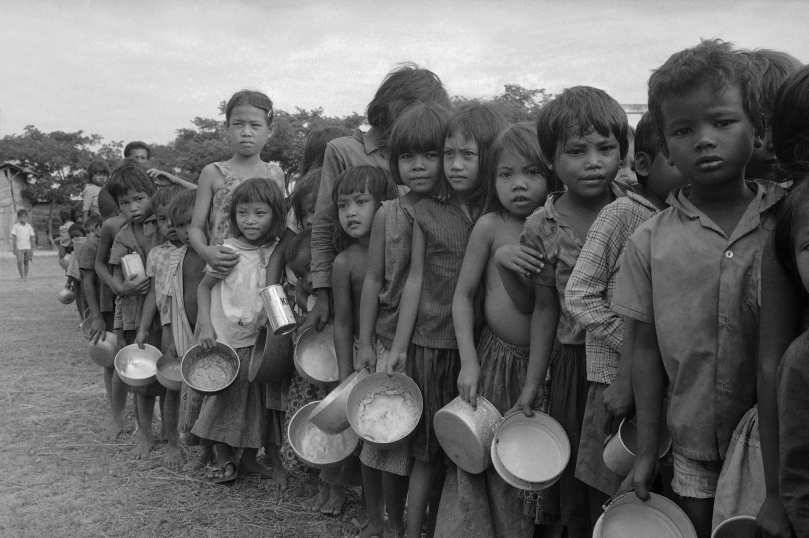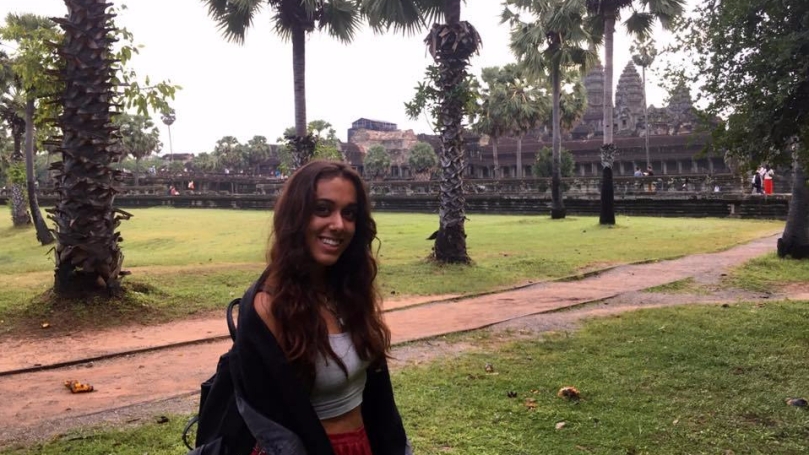So, my favourite gal ever has just released her newly directed movie-documentary ‘First they killed my father’ on Netflix. Angelina Jolie’s new film is based on the memoirs of Loung Ung and her life and escape of the Khmer Rouge in Cambodia. For those hearing about the Khmer Rouge genocide for the first time, know that in the space of four years, an estimated quarter of the Cambodian population were murdered, as well as many others still living with the after effects and consequences of their reign. That’s an estimated of just over 2 million people.

The Khmer Rouge took control of the population and enforced ideas of a farming utopia, where no one would be educated, no one had ‘foreign’ influences and everyone was ‘equal’. Their four-year plan would eventually lead to extreme famine, deaths from exhaustion and a country filled with landmines and mass graves. Anyone with skills, educations, certificate, religious backgrounds and those from ethnic minorities were prosecuted and murdered usually to a blow of the head as the Khmer Rouge had a shortage of bullets. The country had barely any doctors, lawyers, teachers or nurses, so those who were dying, had no help.

Ung’s story
Now, I’ve read Ung’s book and cried almost all the way through it. Her story is heart-breaking and is just one of many. The Netflix movie however, is filmed from a different perspective and is only a snippet of the book. There’s minimal dialogue and could probably be a bit confusing for someone learning about the Khmer Rouge and Cambodia for the first time. I would definitely give the book a read first or do a bit of research prior to watching! At first, I wasn’t 100% sure about Jolie’s remake but once the credits rolled up, I was almost clapping. She’s an amazing woman for sharing the story and making Ung’s story known. So many people are unaware of the horrors that occurred, and it’s not something we would know about otherwise so kudos to Jolie for raising awareness about a topic so close to so many people’s hearts. Her extensive charity work and adoption of her Cambodian son, as well as his own presence and role in the making of the film goes against accusations that her ‘western’ perspective and influence on the story could be negative in any way. She uses her platform and skills to bring important matters to light. A-mazing I tell ya!

Cambodia today
Cambodia was one of my favourite South-East Asian countries that I’ve visited. It’s full of culture, beauty and religion but at the same time you can feel the history, pain and hurt that the country felt and still feel today. Only five people were ever bought to justice for the horrific crimes, and Cambodians continues to live alongside their executioners for years after. The Khmer Rouge’s attempt to reboot society meant that generations of people grew up learning how to fight and kill rather than to teach, heal and help. Cambodia is one of the world’s poorest countries with 30% pf the population surviving one less than $1 a day. The poverty and effects of the genocide is visible all over the country. Psychiatrists estimate that almost half the population are living with PTSD (post-traumatic stress disorder) with 50% of babies born to survivors also developing mental health disorders although they haven’t been physically exposed to such traumas. Slanzi is right when she says that in this case “the simple passage of time does not heal everything” (Slanzi, 2013).

The relevance today with the Rohingya refugees
Although it’s amazing and inspiring to raise the awareness and importance of the Cambodian history, it’s also extremely relevant today. The Rohingya refugee crisis is the now the fastest refugee crisis of our time with over 500,000 refugees fleeing persecution in Myanmar within the space of just over one month. UN high commissioner Zeid Ra’ad Al Hussein said the situation is a “textbook example of ethnic cleansing.” Systematic violence includes severe beatings, gang rape, mass killings and extreme sexual violence. We cannot sit back and watch this happen, learning from the Cambodia atrocities, we must do more to help people facing persecution. Ayesha, a Rohingya refugee who has now fled to Bangladesh said she was raped by twelve soldiers whilst she was held at knifepoint and her family were in the house. It took her eight days to be able to walk again. Her sisters who were also raped, were so badly weakened that they died. They’re in desperate need of aid, food and shelter as well as provisions in the camos in Bangladesh that many have fled to. Their identities have been destroyed, they live in absolute fear and the trauma that they have faced is unimaginable.
Below are some links where you can find some more information on both crisis’s as well as ways you can help and donate. Give the documentary a watch and the book a read! Let’s raise awareness and make a difference in this world 😊
Cambodia and the Khmer Rouge:
- https://www.ted.com/talks/sophal_ear_escaping_the_khmer_rouge
- http://trauma.blog.yorku.ca/2013/07/lest-we-forget-three-decades-after-the-cambodian-genocide/
- https://www.amazon.com/First-They-Killed-Father-Remembers/dp/0060856262/ref=sr_1_1?ie=UTF8&qid=1507135293&sr=8-1&keywords=first+they+killed+%2Cy+father
The Rohingya refugee crisis:
- https://www.facebook.com/InternationalRescueCommittee/videos/10155811786938024/
- http://www.aljazeera.com/indepth/features/2017/09/message-world-mohammed-rohingya-17090907291443.html
- https://www.facebook.com/aljazeera/posts/10156063994828690
- http://news.nationalgeographic.com/2017/09/rohingya-refugee-crisis-myanmar-burma-spd/
- http://www.aljazeera.com/indepth/features/2017/09/rohingya-refugees-share-stories-sexual-violence-170929095909926.html
How to help:
- https://support.unicef.org/donate/help-rohingya-children
- https://donate.unhcr.org/gu-en/rohingya
- http://www.actionaid.org
- https://www.care-international.org/news/press-releases/myanmar-refugee-crisis-women-and-children-in-urgent-need-of-assistance-warns-care
Thanks for reading guys!
Vanisha
X




